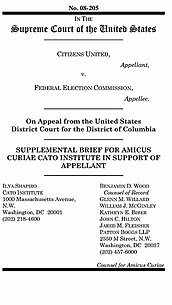Learn more about Cato’s Amicus Briefs Program.
At the March 24 argument in Citizens United v. Federal Election Commission, the U.S. government argued that Section 203 of the Bipartisan Campaign Reform Act of 2002 (otherwise known as McCain-Feingold) permits the FEC to ban corporations, including ideological nonprofits like Citizens United, from making independent expenditures on films, books, or even “a sign held up in Lafayette Park.” The jurisprudential justification for this extraordinary and shockingly expansive view of the government’s power to suppress political speech traces to the Supreme Court’s 1990 decision in Austin v. Michigan Chamber of Commerce. In Austin, the Court held that Michigan had a compelling state interest in banning political speech funded with wealth accumulated using the corporate form. Though the Court contended that such speech, because it bears little correlation to public support for the political ideas expressed, constituted a “different type of corruption,” in reality it upheld Michigan’s statute as a “counterbalance” to the “distorting” and “unfair” influence corporate funds could have on the outcome of elections. This relative-equality rationale — suppressing disfavored speakers to enhance the voice of other government-favored speakers — is antithetical to core First Amendment protections and elsewhere has been expressly rejected by the Court (in Buckley v. Valeo and, more recently, in Davis v. FEC). Accordingly, to decide Citizens United’s appeal, the Court ordered rebriefing and reargument on Austin’s continuing validity. Cato’s brief, the second it has filed in the case, argues that Austin, and the part of McConnell v. FEC that upheld Section 203’s facial validity, are not entitled to stare decisis deference and should thus be overturned. These relatively recent decisions are poorly reasoned, have engendered no reliance interests (no one relies on less freedom of speech), and have spawned an unworkable and irrational campaign finance system in which the government rations different levels of permissible political speech to otherwise equally situated speakers. The case will be reargued September 9.

This work is licensed under a Creative Commons Attribution-NonCommercial-ShareAlike 4.0 International License.

